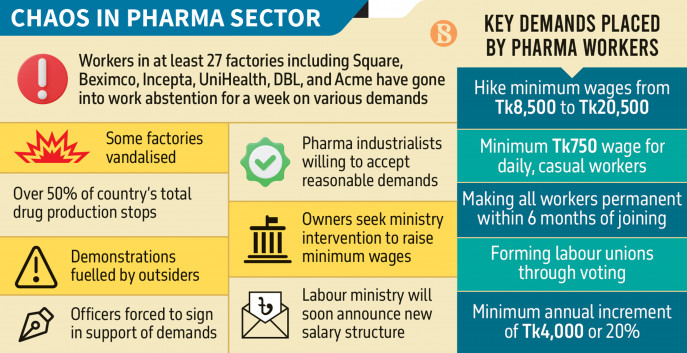Pharma industry in labour turmoil amid ‘outsider instigation’

Although some factories have resumed production after addressing the initial demands, officials and owners report that new protests have emerged with additional demands
The pharmaceutical industry has plunged into turmoil for the last one week with workers demonstrating for job regularisation, wage increases, additional leave, and other issues.
The workers have forced the closure of 27 major drug manufacturers.
Along with presenting their demands, demonstrators are engaging in vandalism at factories, taking officials hostage inside industrial units, and forcing them to sign documents agreeing to their demands. Owners allege that outsiders are instigating the commotion in their factories.
Although some factories have resumed production after addressing the initial demands, officials and owners report that new protests have emerged with additional demands.
Allegation of outsider interference
They have also alleged that outsiders, in addition to workers, are participating in the protests at several factories.
For the past week, workers have been protesting in various parts of the country, including Savar, Gazipur, and Mymensingh. As a result, factories of least 27 companies, including Square, Acme, Orion, Beximco, and Incepta, have been shut down, according to the Bangladesh Association of Pharmaceutical Industries.
Abdul Muktadir, president of Bangladesh Association of Pharmaceutical Industries, told TBS, “We want to meet with the workers and address their reasonable demands. However, it is unacceptable for them to make unreasonable demands after holding officials hostage.”

The protest must be resolved quickly with government intervention. Otherwise, the country’s pharmaceutical sector will be in crisis, he voiced concerns.
Muktadir, also said, “Taking hostages and engaging in vandalism is unfair. The day after accepting one demand, the workers are presenting new ones. This seems to be part of a conspiracy to destroy the pharmaceutical industry. If the protests continue in this manner, the companies will be forced to close.”
Supply crisis feared
Entrepreneurs say market supply is currently being maintained with existing stocks. However, if this deadlock persists, it could create a significant crisis in the country’s medicine supply disrupting medical services and impacting exports as well.
They have called for government support for the immediate resumption of production across all factories.
On Wednesday, workers at the UniHealth Pharmaceuticals factory at Rajendrapur in Gazipur stopped work, presenting a 20-point demand including a demand for elimination of wage inequality.
Key demands
Key demands include the formation of labour unions through voting, setting a minimum daily wage of Tk750 for casual workers, making all workers permanent within six months of joining, raising the minimum wage from Tk8,500 to Tk20,500, and establishing a minimum night allowance of Tk500.
Other demands include a 20% annual wage increase, a two-day weekend, an attendance bonus, a year-end production bonus, and automatic promotion after three years.
The workers also confined top management officials as part of their strike from the morning.
Mohammad Hannan, a foreman at the factory, told TBS, “We are protesting against discrimination. We want equal opportunities for all.”
New demands added
An official at UniHealth, speaking anonymously, said the key work in the factory is performed by chemists and permanent staff. However, some temporary workers and helpers, with the support of outsiders, have been protesting at the factory for days. Although the owners initially accepted their demands, the protesters have continued to agitate with new demands, he added.
“While speaking with the agitators, we identified a few outsiders, but none were willing to reveal their identities. Despite the presence of law enforcement officers, the protesters were not following police instructions,” said the official.
After being closed for three days, Acme Lab, one of the country’s leading drug manufacturers, resumed operations on Wednesday following intervention by army personnel and an agreement with the factory workers.
An Acme official explained that temporary workers, including foremen, mechanics, guards, and canteen staff, initially demanded a doubling of minimum wage.
“The owner agreed to a 50% increase, raising it to Tk12,000. However, the following day, aided by outsiders, the workers began demanding nearly triple the amount, raising the minimum wage to Tk20,500, along with additional demands that could not be met,” he said.
Due to the labour protests, operations have been halted for several days at the factories of the country’s leading pharmaceutical companies, Square and Incepta.
Abdul Muktadir, also managing director of Incepta Pharma, noted that the pharmaceutical industry association has been advancing the industry alongside workers for the past 50 years, but it remains unclear why the workers are protesting with new demands on a daily basis.
In a press conference on Tuesday evening, Muktadir said, “Keeping the scientists and managers hostage, workers are saying that they will not let officials go unless they sign the papers [of agreement].”
“About 400 Incepta staff had been confined from 7am on Tuesday into 3am the following day. Among the protestors are many whom we do not recognise. They are making demands that are almost impossible to meet,” he said.
The workers of a factory in Gazipur confined all the officials from Monday morning to Tuesday afternoon to realise their demands. More than 200 officials of the factory were confined for two days by the protesters. Among them were at least 40 women of whom, some were pregnant, an official of the factory said on his Facebook post.
The managing director of the factory told TBS, “The canteen had run out of food. There was no accommodation in the factory for the night stay of this large number of officials. As a result, everyone had a terrible night. The next day, army personnel came and had to pacify the workers by intense negotiations.”
Abrupt demands hard to accommodate
Production at Orion Pharmaceuticals has also been disrupted due to protests over various demands.
Zareen Karim, managing director at Orion Pharma, said, “We have never encountered a situation where managers are made hostages and forced to accept demands.”
“We want to address the workers’ concerns and find a reasonable solution to their demand for increased wages. If this issue is not resolved promptly, it will negatively impact exports,” she added.
Zareen mentioned that currently, the minimum wage is Tk8,500 and they want it to increase at a reasonable rate.
“The government should facilitate discussions between owners and workers. Regularisation of workers should be negotiated with the government as abrupt changes cannot be accommodated,” she added.
Advisory Council meets to address labour unrest
Meanwhile, the advisory council held a meeting on Wednesday to address labour unrest and protests in various sectors, including the readymade garment industry.
The meeting issued instructions for an army-police joint drive to rein in the involvement of outsiders and to bring workers back to work.
However, no initiative has yet been taken to discuss wages with pharmaceutical sector owners.
Md Jahangir Hossain, secretary (routine duties) at the Ministry of Labour and Employment, stated that a wage board has been constituted to review and increase the minimum wage for workers in the pharmaceutical industry.
“Decisions were made in the first meeting, but the second meeting, scheduled for last July, was postponed due to the political situation. We will meet with pharmaceutical industry owners very soon,” he added.
Jahangir urged everyone to return to work, assuring that the new wage board’s decisions will be announced shortly.
Bangladesh is nearly self-sufficient in medicine, with about 98% of the country’s needs met locally. According to the Directorate General of Drug Administration, there are currently 295 drug manufacturing companies in Bangladesh. The current market size is Tk30,000 crore annually. Medicines produced in Bangladesh are exported to 157 countries. The export amount is around $200 million.







